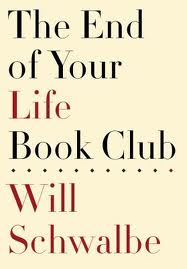Schwalbe, Will.The End of Your Life Book Club. New York: Knopf. 2012. Print
First Sentences:
We were nuts about the mocha in the waiting room at Memorial Sloan-Kettering's outpatient care center.
The coffee isn't so good, and the hot chocolate is worse. But if, as Mom and I discovered, you push the "mocha" button, you see how two not-very-good things can come together to make something quite delicious. The graham crackers aren't bad either.
Description:
Cancer-related books deeply affect me as someone who is three and a half years in remission from Stage 4 Large B-Cell Non-Hodgkin's Lymphoma. Been there and done that.
During that experience and currently, I read a lot of books about cancer and treatment as well as memoirs with personal stories written by fellow "combatants," (my term for any patient, doctor, family member or friend who has had to deal this disease first hand and continues to struggle against its possible return).
Such writers detail, with humor and intelligence, their efforts to live life as a patient or care-giver without succumbing to the overwhelming sadness and helplessness brought on by this disease.
Will Schwalbe's compassionate, humorous, and highly personal The End of Your Life Book Club is one of these great cancer combatant memoirs. In it, Schwalbe documents his relationship with his mother as she (and he) deal with her pancreatic cancer, usually a terminal form of the disease. Mother and son find themselves spending many hours in medical facilities waiting for appointments and treatments, passing the nervous minutes discussing any small matter, including the books each has recently read, to distract themselves.
Seizing on their shared interest of reading, they form a two-person book club to insure that they read what the other is reading and can hold discussions that might take them away from the tedium of waiting. Through their comments about these books and the ensuing bantering talks, they slowly reveal details about their lives, their fears, and their hopes.
We learn that Mary Anne, Schwalbe's mother, is not merely a cancer patient, but a woman of wit and humor, of contemplation and intelligence. She is shown to be a complex, internationally-know humanitarian, the founder of the Women's Refugee Commission, a fundraiser for a new library in Afghanistan, director of admissions for major colleges, and a world traveler. And, of course, she is a voracious, opinionated reader.
We learn that Mary Anne, Schwalbe's mother, is not merely a cancer patient, but a woman of wit and humor, of contemplation and intelligence. She is shown to be a complex, internationally-know humanitarian, the founder of the Women's Refugee Commission, a fundraiser for a new library in Afghanistan, director of admissions for major colleges, and a world traveler. And, of course, she is a voracious, opinionated reader.
We also get to know Will Schwalbe and his struggles to cope with a family member facing terminal cancer. His worries and his hopes rise and fall with her treatments, revealed through the conversations between son and mother over books. The buoyancy and sadness these two experience with each diagnosis, pulls readers slowly and inexorably into their lives, their thoughts, and their emotions. Truly, these are two people you love getting to know.
While this may seem a depressing theme, the book is uplifting, funny, and introspective. Their dialog is witty and pointed as they argue over authors, chastise each other's book selection, and wander off-topic into areas that reveal their character.
Each chapter focuses on a specific time period in her treatment and the book currently up for discussion. Schwalbe helpfully includes a bibliography at the end of the book listing all titles mentioned in their discussions, offering a plethora of reading temptations for any book lover.
The End of Your Life Book Club is highly recommended by one who has been there (me) as an accurate, sensitive portrayal of two individuals, one trying to maintain her wit and individuality while facing cancer treatments, and the other struggling with issues of care and support for a family member. Their relationship, their love of life, and their passion for books are inspiring, funny, and poignant. Please read this book.
Happy reading.
Mukherjee, Siddhartha. The Emperor of All Maladies.
Complete history of cancer from its first appearance and initial treatments to current efforts in the battle with this disease. Extremely readable and fascinating in its clear writing style, its depth of research, and its introduction of key milestones in cancer discoveries and treatments.
Hitchens, Christopher. Mortality.
One man's personal thoughts on his battle with cancer. Very compelling reading to help readers understand what someone with this disease is feeling regarding his illness, how friends interact with him, care from his doctors, and his plans.
Diamond, John. Because Cowards Get Cancer Too: A Hypochondriac Confronts His Nemesis.
Halpern, Susan. The Etiquette of Illness: What to Say When You Can't Find the Words.
Thoughtful, personal, and humorous account of John Diamond's long struggle with cancer as originally told through his column in the Times of London. Highly recommended along with the Hitchens' book for anyone who wants to know what having cancer is like. His words ring true to me as a fellow cancer patient.
Excellent suggestions and practical applications for talking (or not talking) to people with illness: how to say what you want without causing offense or embarrassment, what they want you to say, when to just remain silent. Very valuable examples and advice for well-intentioned friends and family of patients of all ages and illnesses.

I appreciate the fresh perspective you bring to reviewing this book -- it sounded interesting before, but now I really want to read it. And welcome to the Blogosphere, Fred!
ReplyDelete